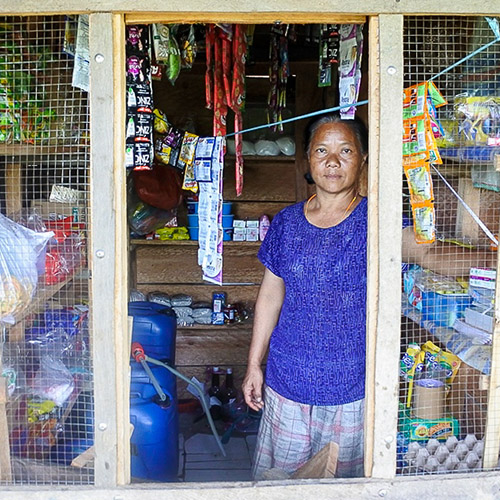Stories of Change

Suriati stands in the kiosk in her home, which she restocked with a loan from her savings and lending group.
An investment ripples out through a family
It’s a story you’ve probably heard from your friends and neighbors plenty of times: having a child in college can take a toll on a family’s finances. Sometimes making that investment in someone’s education means taking on extra work, and sometimes it means taking out loans when you wish you didn’t have to.
Suriati Roro and her husband have two sons in college. The family earns a living through farming rice, cocoa and coffee – it’s the typical livelihood of a family in this part of Indonesia. They also have a small food kiosk near the local junior high school where they sell noodles and cakes.
In the last few years, though, finances have been tight for the family. They had to close a larger kiosk that they operated out of their house because they couldn’t afford to restock it. Suriati went to the bank to try to get a loan to keep the kiosk open, but her application was rejected. Other people who had borrowed from the bank for similar reasons in the past hadn’t repaid their loans, so Suriati was considered too high risk. Without the bank loan, she turned to other lenders. “I once borrowed money to restock my kiosk from a neighbor at seven percent monthly interest, which was quite high and burdening to me and my family,” she says.
Without that kiosk, the family began to struggle. “If we depended on our farm interest alone, we could not finance the children who are in college; the money just wouldn’t stretch that far,” Suriati says. “This is especially true for the last couple of years; our cocoa plants haven’t been producing as much as in the past, and our coffee harvest has also slowed down.” She’s describing a challenge that many families like hers are facing: gradual changes in the climate make it hard to rely on rain-fed agriculture, which is what they have done for generations.
Families like Suriati’s are working hard to make that challenges outside of their control – whether it’s climate change, economic uncertainty or a disaster – won’t destroy their income and livelihoods. One of the most effective ways to build this resilience is to have multiple income streams.
That brings us back to the kiosk at her house.
Through the CWS DREAM programs, people like you are investing in community groups in the area. Members of these savings and lending groups contribute a little bit each month. Group members can borrow from that pool of money to start or expand businesses – at a very reasonable interest rate (in this case, two percent).
Two months ago, Suriati took out her first loan from the Mawar Savings and Loan Group.
It was a loan for $35 to reopen her household kiosk. Suriati focused on goods the sell with a quick turnaround, like gasoline for motorbikes and popular vegetables, cakes and snacks. With the kiosk back in operation, her family is making about $2.50 each day in profit. They are saving some profit to pay back their loan, on time and in full with interest. But they’re also using those profits to pay their sons’ college expenses.
“I am very grateful for the Mawar Savings and Loan Group because it has given my family and me the ability to invest in our future. I plan to apply for a larger loan after I pay off my current one. I want to expand my kiosk business near the school to sell more school supplies, uniforms and shoes,” Suriati says.
People like you invested in Suriati and other hardworking entrepreneurs. She, in turn, invested in her business and in her sons’ education. It’s an investment that is rippling out to improve many lives.
